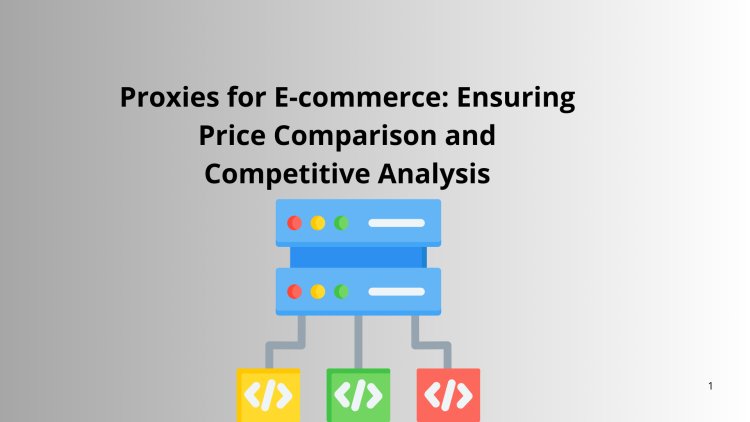Proxies for E-commerce: Ensuring Price Comparison and Competitive Analysis
In the competitive e-commerce landscape, staying informed about market trends, competitor pricing, and product availability is essential. Proxies serve as a powerful tool for businesses looking to gain actionable insights without being hindered by restrictions or detection. This article explores how proxies are used in e-commerce for price comparison, competitive analysis, and market research, offering businesses a significant edge in their strategies.
Why Are Proxies Important in E-commerce?
A proxy server acts as a gateway between a user and the internet, masking the user's IP address and enabling access to websites without revealing their identity. For e-commerce businesses, this functionality is crucial in:
- Accessing competitor websites without detection.
- Gathering region-specific data for geo-targeted analysis.
- Scaling web scraping efforts effectively.
How Proxies Enhance Price Comparison
1. Avoiding IP Bans and Restrictions
Many e-commerce platforms have anti-scraping mechanisms to detect and block repeated requests from the same IP. Proxies, particularly rotating residential proxies, allow businesses to bypass these restrictions by assigning new IPs for every request.
2. Real-Time Price Monitoring
With proxies, businesses can collect real-time pricing data from competitors across various regions. This helps in dynamically adjusting their pricing to remain competitive and maximize profitability.
3. Multi-Region Price Analysis
Proxies enable companies to access region-specific pricing and promotions by providing IPs from different countries. This allows e-commerce businesses to evaluate market trends and competitor strategies in global markets.
Proxies for Competitive Analysis
1. Access to Geo-Restricted Content
Certain websites or content may be restricted based on location. Proxies help bypass these restrictions, enabling businesses to monitor global competitors’ products, pricing, and customer reviews effectively.
2. Gathering Competitor Inventory Insights
Proxies allow businesses to scrape data about competitors' product availability and inventory trends. This information helps e-commerce brands plan their inventory strategies and identify gaps in competitor offerings.
3. Trend and Sentiment Analysis
By scraping customer reviews and feedback from competitor platforms, businesses can identify trends in customer preferences and sentiment. Proxies ensure uninterrupted and anonymous access to such data.
Choosing the Right Proxies for E-commerce
1. Rotating Residential Proxies
- Ideal for avoiding detection during large-scale web scraping.
- Provides high anonymity and reliability.
2. Datacenter Proxies
- Fast and cost-effective but may be more easily detected by advanced anti-scraping systems.
- Suitable for smaller-scale operations.
3. Mobile Proxies
- Uses mobile IP addresses, making it nearly impossible for competitors to detect or block.
- Perfect for accessing highly secure e-commerce platforms.
Best Practices for Using Proxies in E-commerce
-
Use Reputable Proxy Providers
Partner with trusted providers to ensure high-quality IP addresses and reliable service.
-
Combine Proxies with Web Scraping Tools
Use proxies alongside tools like Python’s Beautiful Soup or Scrapy to automate data collection.
-
Monitor Proxy Usage
Regularly review and rotate proxy servers to maintain efficiency and prevent detection.
-
Stay Compliant with Local Laws
Ensure that data scraping and proxy usage comply with the legal and ethical guidelines of your region.
Conclusion
Proxies are indispensable tools for e-commerce businesses aiming to excel in price comparison and competitive analysis. They empower companies to gather critical data, monitor market trends, and optimize strategies without being hindered by geo-restrictions or anti-scraping measures. By selecting the right proxies and implementing them effectively, businesses can stay ahead of competitors and thrive in a dynamic marketplace.
Would you like assistance with specific tools or examples related to proxies in e-commerce?



















